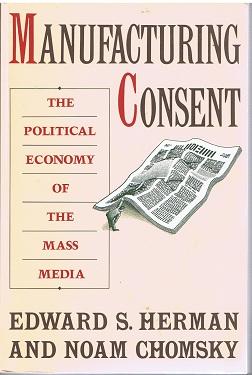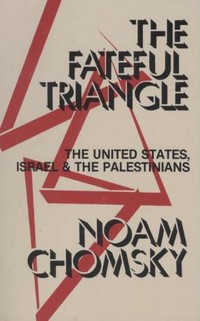Brilliant takedown of Chomskys attempt to run interference for the Pol Pot regime and any excuse that he was just being skeptical. It’s many pages long so I just cut out some relevant bits.
After the Cataclysm is, according to Chomsky and Herman, concerned primarily with "U.S. global policy and propaganda, and the filtering and distorting effect of Western ideology."
(30)Consequently, many of Chomsky's supporters claim that it is unfair to criticize the book on the basis of the impressions it might convey about Vietnam, Laos, or Cambodia. The book includes a disclaimer to that effect: "[W]e have not developed or expressed our views here on the nature of the Indochinese regimes."
(31)
This disclaimer, however, comes after nearly 300 pages of arguments that seem to be expressing a very clear set of views. This is surely inevitable: if one is to contend that a particular viewpoint is "filtered" or "distorted," one must have some opinion of what constitutes an unfiltered or undistorted view.
Near the beginning of the chapter on Cambodia, Chomsky and Herman note that "it is surely worthwhile, if one is going to discuss Cambodia at all, to try to comprehend what has in fact taken place there, which is quite impossible if critical standards are abandoned and 'facts' are contrived even out of honest anger or distress."
(32) Given that Chomsky and Herman spend the next 150 pages discussing Cambodia, one can assume that the authors are indeed trying to comprehend what had taken place under the Khmer Rouge. Their claim -- that the media was distorting the truth about the Khmer Rouge -- necessarily implies that the image painted by the media was inaccurate.
Falsehoods and misrepresentation abound, according to Chomsky and Herman, and "evidence about Cambodia has a way of crumbling when one begins to look at it closely, a fact that should raise some questions about the examples that have not been investigated because of their lesser prominence in the international campaign."
(33)
This theme is consistent throughout the book: the widely accepted view of the Khmer Rouge was based on dubious evidence. Chomsky and Herman begin painting their alternative picture in the book's Preface:
“The ferocious U.S. attack on Indochina left the countries [of Vietnam, Laos, and Cambodia] devastated, facing almost insuperable problems. The agricultural systems of these peasant societies were seriously damaged or destroyed... With the economies in ruins, the foreign aid that kept much of the population alive terminated, and the artificial colonial implantations no longer functioning, it was a condition of survival to turn (or return) the populations to productive work. The victors in Cambodia undertook drastic and often brutal measures to accomplish this task, simply forcing the urban population into the countryside where they were compelled to live the lives of poor peasants, now organized in a decentralized system of communes. At heavy cost, these measures appear to have overcome the dire and destructive consequences of the U.S. war by 1978."
The reference to "brutal measures" suggests that Chomsky and Herman were beginning to back away from the stance in their
Nation article, which had implied that Hildebrand and Porter's "very favorable picture" of the Khmer Rouge was more accurate than Barron and Paul's and Ponchaud's negative views. Nonetheless, Chomsky and Herman still seemed unaware -- or unwilling to admit -- that the regime had been an unmitigated disaster. Moreover, they seemed determined to deflect blame away from the Khmer Rouge. Thus, they imply that the Khmer Rouge were forced to implement these "drastic" measures in part because foreign aid had been terminated. They neglect to mention that the foreign aid was terminated
by the Khmer Rouge. Francois Ponchaud pointed this out in
Year Zero, noting that the Khmer Rouge even refused a transport plane which had been previously loaded with urgently needed medical supplies.
(35)
There is similar sophistry in the claim that the urban population was "forced to live the lives of poor peasants." Peasants in years prior to the Khmer Rouge did not suffer the repression imposed upon the evacuees (the "new people") by Angkar. The population was not forced to live the lives of peasants: they were forced to live the lives of slaves.
The claim that the policies implemented by the Khmer Rouge managed to "overcome" the difficulties of the damaged economy is contradicted by the evidence. Khmer Rouge economic policies, if they can even be called that, were brutal, naive, inefficient, and often downright destructive.
In
The Quality of Mercy, describing his visit to Cambodia in 1979, William Shawcross noted that there was no way to evaluate the rice production during the Khmer Rouge years:
"Rather astonishingly, rice was being exported again, but the Cambodian people themselves were being deprived of adequate rations throughout much of the country. Afterward, peasants claimed that the vast new fields, dams, and canals that they had been ordered to build rarely worked. Instead they upset the ecological balance of the countryside.
"Once, I was in a boat steaming up a narrow river, just off the Great Lake. I was being taken to see a fishery in one of the richest of the fishing areas. Along with rice, fish is a staple food in Cambodia and the most important source of protein. Long before our old boat came around the bend of the river, an extraordinary smell came wafting out to greet us. The river was jammed with hundreds of thousands of dead fish, packed tight as ice floes. What had happened? I asked. 'Pol Pot' came the reply.
"It turned out that the Khmer Rouge had built a huge dam just upstream from here and the water in this ancient fishing village was now far shallower than it had ever been before. In the heat of the dry-season sun the fish had, quite simply, cooked." |
The Cambodian communists' economic plans were, at times, utterly surreal. Scholar David Chandler notes that, in a Democratic Kampuchea report on General Political Tasks of 1976, there are three lines devoted to education, and six devoted to urine. The document states that, regarding human urine, "We collect thirty per cent. That leaves a surplus of 70%."
(37). These were indicative of the types of policies that Chomsky and Herman claimed had lifted Cambodia out of the ashes of war.
The Preface of
After the Cataclysm sets the tone for the entire book: again and again, Chomsky and Herman apply dubious spin to reality. Commenting on the flow of boat people out of Vietnam, for example, Chomsky and Herman claim that "In a sense, the refugee flow from Vietnam in 1978 is comparable to the forced resettlement of the urban population of Cambodia in 1975."
(38)How is an exodus of refugees, voluntarily risking their lives to escape a communist regime, in any way comparable to the deadly forced march into the Cambodian countryside?
Rather than expressing concerns about the fate of the Khmer people, Chomsky and Herman seem primarily concerned with the "abuse" directed at the Khmer Rouge regime:
While all of the countries of Indochina have been subjected to endless denunciations in the West for their 'loathsome' qualities and unaccountable failure to find humane solutions to their problems, Cambodia was a particular target of abuse. In fact, it became virtually a matter of dogma in the West that the regime was the very incarnation of evil with no redeeming qualities, and that the handful of demonic creatures who had somehow taken over the country were systematically massacring and starving the population
Whether or not this was a matter of "dogma" hardly seems important in the context of the larger question: was the regime
really systematically murdering and starving its people? From time to time, Chomsky and Herman acknowledge that there were, perhaps, some bad things happening in Cambodia, but they quickly shift focus back to their propaganda model. After arguing that, in Vietnam, the treatment of "collaborators" has been "relatively mild,"
(40) the authors allowed that the situation in Cambodia was different:
But in the case of Cambodia, there is no difficulty in documenting major atrocities and oppression, primarily from the reports of refugees, since Cambodia has been almost entirely closed to the West since the war's end... The record of atrocities in Cambodia is substantial and often gruesome, but it has by no means satisfied the requirements of Western propagandists, who must labor to shift the blame for the torment of Indochina to the victims of France and the United States. Consequently, there has been extensive fabrication of evidence, a tide that is not stemmed even by repeated exposure
An analysis of Noam Chomsky and Edward Herman's writings about Cambodia.
www.mekong.net











